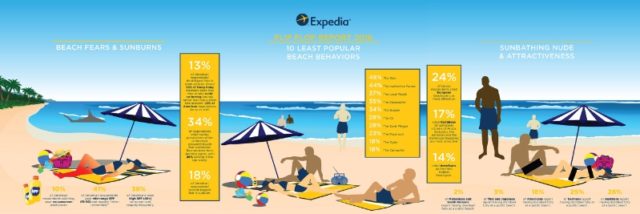
Expedia.com® released the results of the 2016 Expedia® Flip Flop Report, an annual study of beachgoer behavior across North America, South America,Europe, Asia, Australia and New Zealand.
In particular, the study looks at which country’s residents are likeliest to disrobe fully, what beach behaviors are considered least appropriate, where the most attractive beachgoers can be found and much more.
In particular, the 2016 Flip Flop Report found that respondents from Austria are most inclined to go au natural when visiting the beach—marking the first year that Austria has held the top spot.
American respondents largely disapprove of toplessness or nudity at public beaches. A whopping 62 percent describe themselves as “somewhat or very uncomfortable” with that level of exposure—up from 44 percent in 2014. Further, 77 percent of American female respondents report that they would “never” go topless at a public beach.
Report data also revealed that:
- 23 percent of Americans would use beach WiFi to share what they are currently doing on Instagram or Snapchat
- Beer is the world’s favorite alcoholic beach drink, cited by 28 percent of respondents worldwide
- Having possessions stolen is the most prevalent beach fear worldwide, cited by 34 percent of respondents
- Austrians are the most likely beachgoers to sunbathe fully nude
- About 53 percent of Hong Kong residents state that they simply avoid swimming entirely rather than risk a shark bite incident (Roughly 22 percent of American respondents do so as well)
The 2016 Expedia Flip Flop Report was commissioned by Expedia.com and conducted online by Northstar, a global research and consulting firm. The study was conducted with 11,155 adults 18 years of age and older, across 24 countries and on five continents.
Americans split on the Speedo
When asked their opinion of Speedo-style beachwear on men, American respondents were not fans. About 48 percent of Americans feel Speedo-style swimwear is “acceptable” attire for men, but only 6 percent of American men claim to wear it. Worldwide, 63 percent of responding beachgoers approve of Speedo-style bathing suits.
Europeans the world’s best-looking beachgoers
The most attractive beachgoers can be expected to be found in Europe, according to Flip Flop Report findings. Worldwide, 24 percent of survey respondents cited European beachgoers as most attractive, with Caribbean (17 percent) and American (14 percent) beachgoers rounding out the top three.
Beach etiquette: a look at the most annoying beach behaviors
The 2016 Flip Flop Report also asked respondents to gauge the most annoying beachgoer behaviors. “The Slob,” the person who doesn’t clean up after himself and leaves garbage on the beach, occupies the top slot worldwide.
To avoid sunburns, 33 percent of worldwide respondents and 38 percent of respondents from the United Stateswear high-SPF (45 or higher) sunscreen and reapply frequently. Forty-one percent of American respondents wear mid-range SPF (15-30) and reapply “when I remember.” Ten percent of American respondents said they wear no sunscreen whatsoever.
Beach breakdown: top destinations and vital factors
Survey respondents certainly continue flocking to the beach. About 46 percent of Americans said they had taken a beach vacation in the past 12 months, and 48 percent of respondents said they intend to do so in the next 12 months.
Within America, Florida’s beaches are the favorite. Worldwide, Spain’s beaches were the most visited by study respondents, followed by beaches in Australia, Italy and Mexico.
Relaxation/doing nothing is the world’s favorite beach indulgence (cited by 74 percent). Reading and napping are the next-most preferred activities, at 44 percent. However, about 17 percent of Americans work while sunbathing.
RELATED LINKS
http://www.expedia.com












